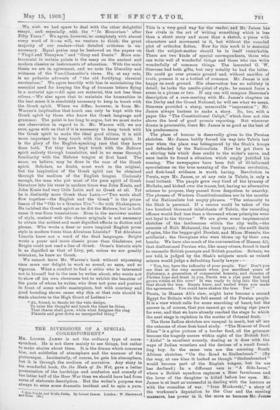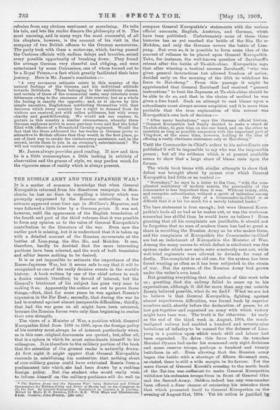THE DIVERSIONS OF A SPECIAL CORRESPOND ENT.*
Ma, LIONEL JAMES is not the ordinary type of corre- spondent. He is not there mainly to see things, but rather to make stories about them. It is the drama which concerns him, not subtleties of atmosphere and the nuances of the picturesque. Incidentally, of course, he gets his atmosphere, but it is through the medium of narrative. Any story in hie wonderful book, On the Heels of De Wet, gave a better presentation of the hardships and confusion and comedy of the latter half of the Boer War than we should have had from acres of elaborate description. But the writer's purpose was always to seize some dramatic incident and to spin a yarn.
* Bide-Tracks and Bridle-Paths. By Lionel James. London ; W. Blackwood and Sons. 1.8e] This is a' very good 'way for the reader, and Mr. Jaines bas
few rivals in the art of Writing something which is less than a short story and more than a sketch, a piece with characters and movement in it, but without the rounded plot of orthodox fiction. Now for this work it is essential that the subject-matter should be in itself remarkable. There are two kinds of special correspondents, those who can write well Of wonderful things and those who can write wonderfully of common things. The lamented G. 'W. Steevens had both gifts, but very notably he had the latter. He could go over prosaic ground and, without sacrifice of truth, present it as a hotbed of romance. Mr. James is not happy on such ground. His observation has no subtlety; in detail; he lacks the needle-point of style ; he cannot focus a scene in a phrase or two. If any one will compare Steevens's description of a race-meeting with Mr. James's chapters On the Derby and the Grand National, he will see what we mean. Steevens provided a sharp, memorable " impression " ; Mr. James always hastens to make a story. So, too, with a paper like " The Constitutional Caliph," which does not rise above the level of good prosaic) reporting. Bat wherever drama is procurable, there Mr. James is as good as the best of his predecessors.
The place of honour is deservedly given to the Persian sketches. Mr. James boldly forced his way into Tabriz last year when the place was beleaguered by the Shah's ts.00ps and defended by the Nationalists. How he got there is a stirring tale which does credit to the writer's nerve, and once inside be found a situation which amply justified hiS coming. The newspapers have been full of ill-informed speculations on the true meaning of the Persian tevolutioii, " and first-band evidence is worth having. Revolution in Persia, says Mr. James, or at any rate in Tabriz, is only a local irritant. The people grew very tired of the tyranny of . Mullahs, and kicked over the traces, but, having no alternative schema to propose, they passed from despotism to anarchy. The phrases of Western Constitutionalismare in the mouths of the Nationalists but empty phrases. "The animosity to the Shah is personal. If a census could be taken of the two hundred thousand inhabitants of Tabriz, the recording officers would find less than a thousand whose principles were not loyal to the throne." We are given some impressionist sketches of the lawlessneaa within the city walla,—the nemesis of Nails Mahamed, the local tyrant; the swift death
of spies, like the beggar-girl. Dowlati, and Mime Hussein, the artillerist; the Georgians who were blown up by their own
bombs. We have also much of the conversation of Hassan An, that disillusioned Persian who, like many others, found it bard to reconcile British precepts and British practice. Britain, we are told, is judged by the Shah's subjects much as ruined minors would judge a, defaulting family lawyer :---
" You, too, have the infirmity of your people. Yes! Don't you see that at the very moment when you sacrificed years of diplomacy, a generation of commercial honesty, and decades of Persian hope and trust in you, Persia was a ripe pear that had grown rotten at the core? It was ready to drop into the hand that shook the tree. Russia know, and smiled when you made the agreement. You could have shaken the tree. Yes !"
Persia, in Hassan Ali's view, might have become a second Egypt for Britain with the full assent of the Persian people.. It is a view which calls for some searching of heart, but the answer is, of course, that you cannot go on eating ripe pears for ever, and that we have already reached the stage to which the next stage is repletion in the matter of Oriental fruit.
The three Indian sketches are unequal in merit, but all are the outcome of close first-hand study. " The Honour of Daud Khan" is a grins picture of a border feud, all the grimmer because the tragedy occurs within eight of the British feet. "Abdul" is excellent comedy, dealing as • it does with the ways of Indian wrestlers and the devices of a small found- ling boy. In the same vein are the amusing South African - sketches, " On the Road to Stellenbosch." (By the way, at one time it looked as though " Stellenbosched"
would become part of the English tongue, but its use has declined.) In a different vein is "A Side-Issue," where a British squadron captures a Boer farmhouse and the lover of the daughter is killed before her eyes. Mr. James is at least as successful in dealing with the horrors as with the comedies of war. "Ivan Moskovski," a story of, the workmen's deputation to the Czar and the ensuing massacre, has power in it, the more so because Mr. James
refrains from any obvious sentiment or moralising. He tells his tale, and lets the reader discern the philosophy of it. The most amusing, and in many ways the most successful, of all his chapters, however, is the account of his visit in the company of two British officers to the German manceuvres. The party took with them a motorcar, which, having passed the Customs officials with endless delays and troubles, seized every possible opportunity of breaking down. They found the average German very cheerful and obliging, and were entertained by some Cuirassiers, one of whom turned out to be a Royal Prince,—a fact which greatly facilitated their later journey. Here is Mr. James's conclusion :—
" A very erroneous estimate exists in this country of the natural feelings of the German and his individual attitude towards Britishers. Those belonging to the ambitious classes, and certain of those of the commercial caste, may entertain some bitterness owing to the successes of this country, but as a whole the feeling is exactly the opposite ; and, as is shown by this simple narrative, Englishmen conducting themselves with that decorum which every country has a right to demand from its visitors are received, not with sullen politeness, but with every charity and good-fellowship. We would ask our readers to picture in this country a similar circumstance, whereby throe German explorers arrive in some garrison town and find the hotel filled with officers of a Household Cavalry regiment. Would the fact that the three addressed the bar-tender in German prove so attractive to British officers that they would, in the first place, go out of their way to render the visitors every assistance, and, in the second, invite them to join in an evening's entertainment P We will not venture upon an answer ourselves."
Mr. James always provides good reading. If now and then he is a little commonplace, a little lacking in subtlety of observation and the graces ot style, we may pardon much for the vigorous sense of reality which is always present.











































 Previous page
Previous page